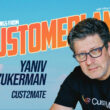Editor’s Note: While we couldn’t have anticipated a pandemic or the broad reaching impact it has in the short term (yes – the short term!), the reality is that this won’t likely continue for months or years. The economic engines were running efficiently and effectively prior to this crisis. Undoubtedly, job movement will become hyperactive with the workforce looking for better jobs, treatment, appreciation and compensation. Keep in mind, the healthier your competitor’s culture and financial position are, the more talent-risk your business faces. So what are you doing to get ready for the inevitable bounce-back? Michael Fisher offers some critical guidance for those tasked with leading during this time of crisis.
Change is afoot as always. Sometimes it’s blindingly fast like the Covid19 crisis. Sometimes its operationally daunting such as GDPR/CCPA. Sometimes it is as complex as the digital transformation that is disrupting industries and generating entirely new business models. Sometimes it comes in the form of competitive pressures as our economy get Amazoned by supply chain and marketplace development initiatives that reach consumers in very new, convenient and economically attractive ways.
By Michael Fisher Ed.D.
Regardless of the size or scale of the problem there always seem to be recommendations on what to do, how to lead and when to lead. I’m sure you have seen the deluge hitting your communication channels hourly.
The reality is, as leaders we should always be leading because life doesn’t stop. On the contrary, life is the continual shifting of each of our journeys. Rest assured, change is always here, and as leaders it is our role to secure the insecure, refocus the distracted, and above all to celebrate what’s being accomplished regardless of how big or small. In times of disruptive change, we can lead, or we can be led; and the choice, quite frankly, is ours.
Below are a few things to consider in these tumultuous times. By no means am I suggesting these are one size fits all solutions. Businesses have specific needs, but in my experience tackling these items is crucial to move through the crises we currently face.
Accept and Acknowledge
The first thing to do is be completely open and honest with your teams. Adverse events occur all the time, and while we can prepare as organizations to adjust to chaos, sometimes we cannot predict what is coming. Be confident, and committed, sugar-coating or conversely, painting daunting pictures will result in those you lead doubting you. Be honest, transparent and truthful. Everyone knows there are unforeseen problems. The worst thing to do is demonstrate a lack of acceptance, accountability and acknowledgement. As a leader, always remember that your organization is your fault, good or bad.
Plan Accordingly
If you accept and acknowledge the challenges at hand, and help your organization understand that you recognize those challenges, it’s always good to explain your plans. It is ok to say you don’t have a fully flushed out plan during unforeseen events and it is ok to ask for support and guidance from those you lead. Often, planning that includes collaboration with team members leads to greater and more efficient outcomes while fostering cohesion. And that often results in a more connected and committed culture. Take the opportunity to demonstrate and tell stories of when adversity has been overcome and use team examples when possible.
TIP: Build and catalog an inventory of stories and use them to emphasize key points within your plan.
Clarity is King
No matter how you’re addressing your teams, whether you are acknowledging or planning, clarity is of the utmost importance. If you want people to align with your resolution, they can only follow what they understand. If they don’t understand they will stand and wait for you to make it clear to them. It is crucial to foster feedback, ask questions, address questions and comments with openness and transparency. Listen for the things you want to hear and pay closer attention to the things you don’t want to hear. Don’t ignore what you don’t like, but in fact embrace and ask for assistance to resolve those things you don’t know or don’t want to hear.
Allies and Influencers
Recognize the power of the Social/Emotional leader. Identify them and embrace them and then solicit their help. We’ve all recognized the individuals that participate in meetings, provide aligned feedback, active support and engagement, and then after the meeting is over, they’re the first ones at the water cooler discussing their interpretations – what they heard, and why they don’t support what they heard. Recognize the power of the social/emotional leader, and instead of battling, simply engage. Ask them for help and recognize their need for amplified inclusion. At the same time, pay close attention to the outcomes, and don’t be afraid to pull the plug on the cancerous social/emotional leaders that cannot support the plan. Don’t wait too long or your hesitancy will be seen by others as a blind spot to disingenuous and duplicitous acts and could result in significant delays or loss of talent.
Disciplined Fortitude
Ensure you have the resolve to stick with your plan – especially when the naysayers deliver their doubts. Giving your plans enough time to germinate and bear fruit is critical but don’t dig your heals in and protect your plans when you receive data that says it’s time to adjust. Your ability to stick to your plan and course-correct at the appropriate time is critical and will be evaluated across your organization. Ask for key metrics that identify success or failure and develop alternative plans for those times when adjustments are needed. It’s critical to know that plans will always have inflection points, your ability to stick to what’s tough and pivot when needed, instills confidence, creates ambassadors and fuels social and emotional leaders to amplify plan success. If you cave early, your cave will only grow dimmer and will be more difficult to emerge from. Hanging on too long can also deliver the same dimming light, so pay close attention to obstacles and variables.
Over Communicate
Effective communication is a requirement for leading through adversity or chaotic challenges. I talk to my leaders all the time and remind them that if they provide an opportunity for their people to draw their own conclusions due to lack of clear, concise consistent communication, they in fact, will. And those conclusions will never be consistent with, or supportive of, the organization’s plans. Plan your communication strategy, be open and honest about when you’ll be presenting updates, create forums for feedback and stick to your communication commitments. DO NOT expect people to share what you hope they’ve heard. They can’t.
From the Front
Conflict and chaos are tough so don’t let others do what you should be doing. Be on the front line, show commitment, and if you’re unwilling to then don’t ask others to do it for you. Don’t be afraid to solicit help from people who possess strengths you don’t have or don’t have the experience to deliver against. Your people watch closely during contentious times so avoid being the single point of failure. Nevertheless, your job is to stand on the front line and lead.
Conclusion
Know that you may have tough decisions to make because the factors that got you here will likely need to change. Changes in policy, procedure or personnel may be required and your customers must be considered in every major initiative.
Finally, take the time to lead with love and don’t overlook the needs of your people. Ask them for feedback, collaborate with and include them. Foster cohesion and do it with empathy, love and compassion. For when you do that for your people, they in turn will do it for your customers and you will find your way out of the chaos into new pathways of growth.
 As CEO of FLIT Consulting, Michael Fisher, Ed.D brings over 25 years of experience in organizational transformation through research, education, and revenue growth. He specialized in helping companies build collaborative, connected, cohesive cultures, with a commitment to personal and professional development and success. Disciplines included: progressive leadership and decision making, responsive data and analytics, nimble sales effectiveness, and agile customer data and business intelligence technology assessments. Additionally, Michael is on the board of directors of TheCustomer.
As CEO of FLIT Consulting, Michael Fisher, Ed.D brings over 25 years of experience in organizational transformation through research, education, and revenue growth. He specialized in helping companies build collaborative, connected, cohesive cultures, with a commitment to personal and professional development and success. Disciplines included: progressive leadership and decision making, responsive data and analytics, nimble sales effectiveness, and agile customer data and business intelligence technology assessments. Additionally, Michael is on the board of directors of TheCustomer.











Hello Dr. Fisher,
Thank you for the clear and honest overview! Stay well.
Amy